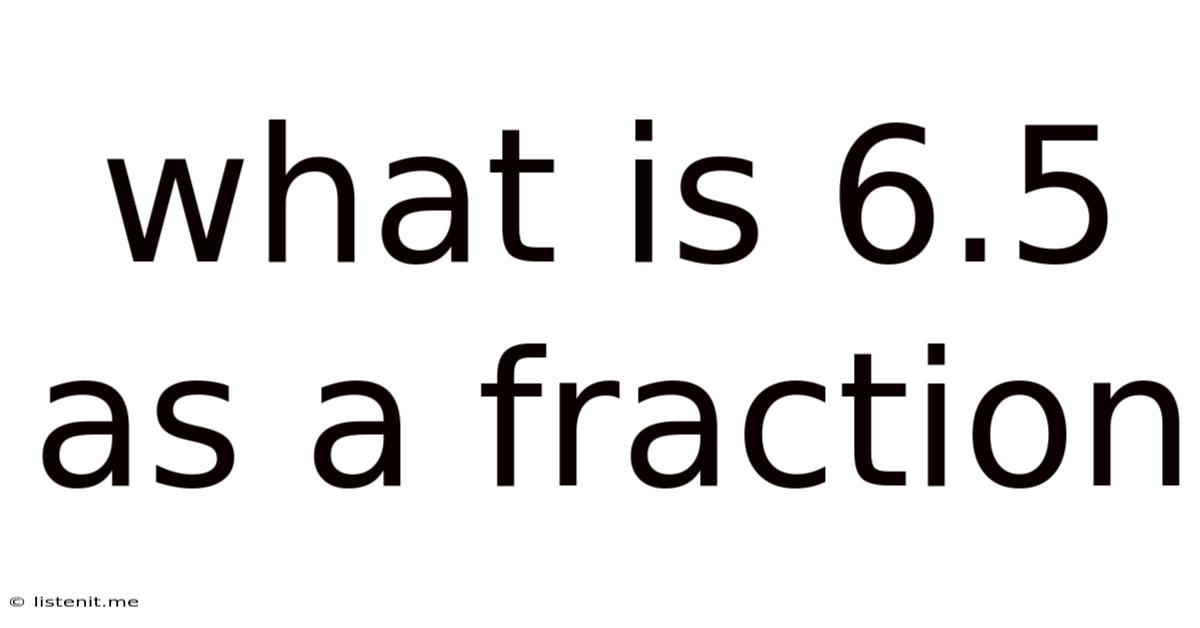What Is 6/5 As A Fraction
listenit
May 24, 2025 · 4 min read

Table of Contents
What is 6/5 as a Fraction? Understanding Improper Fractions and Mixed Numbers
The question "What is 6/5 as a fraction?" might seem deceptively simple at first glance. After all, 6/5 is a fraction. However, the true understanding lies in recognizing its form and how to represent it in other equivalent ways, specifically as a mixed number. This article will delve deep into the concept of improper fractions, converting them to mixed numbers, and exploring the practical applications of this fundamental mathematical skill.
Understanding Fractions: A Quick Refresher
Before we tackle 6/5, let's quickly review the basics of fractions. A fraction represents a part of a whole. It consists of two main parts:
- Numerator: The top number, indicating the number of parts we have.
- Denominator: The bottom number, indicating the total number of equal parts the whole is divided into.
For example, in the fraction 3/4, the numerator (3) represents three parts, and the denominator (4) represents that the whole is divided into four equal parts.
What Makes 6/5 an Improper Fraction?
The fraction 6/5 is classified as an improper fraction. This is because the numerator (6) is larger than the denominator (5). In simpler terms, it represents more than one whole. Proper fractions, on the other hand, have a numerator smaller than the denominator (e.g., 3/4, 1/2, 2/5).
Converting Improper Fractions to Mixed Numbers
Improper fractions are often converted into mixed numbers for easier understanding and practical use. A mixed number combines a whole number and a proper fraction. The conversion process involves division:
-
Divide the numerator by the denominator: In the case of 6/5, we divide 6 by 5.
-
Determine the whole number: The quotient (the result of the division) becomes the whole number part of the mixed number. 6 divided by 5 is 1 with a remainder of 1. Therefore, our whole number is 1.
-
Determine the remaining fraction: The remainder becomes the numerator of the proper fraction, and the original denominator remains the same. In our example, the remainder is 1, so the proper fraction is 1/5.
-
Combine the whole number and the proper fraction: This gives us the mixed number representation. Therefore, 6/5 as a mixed number is 1 1/5.
Visualizing 6/5
Imagine you have five slices of pizza, representing the denominator. 6/5 means you have six slices. This is more than one whole pizza. You have one whole pizza (5 slices) and one extra slice (1/5 of a pizza). This visually demonstrates the equivalence of 6/5 and 1 1/5.
Practical Applications of Improper Fractions and Mixed Numbers
The ability to convert between improper fractions and mixed numbers is crucial in various applications:
-
Cooking and Baking: Recipes often call for fractional amounts of ingredients. Understanding improper fractions allows for accurate measurement and scaling of recipes. For instance, a recipe might call for 7/4 cups of flour; converting this to 1 ¾ cups simplifies the measurement process.
-
Construction and Engineering: Precise measurements are vital in construction and engineering. Improper fractions are often encountered in calculations involving dimensions and materials. Converting them to mixed numbers can make these calculations clearer and easier to implement.
-
Data Analysis: Improper fractions might arise when dealing with proportions or ratios in data analysis. Converting to mixed numbers can provide a more intuitive understanding of the data.
-
Everyday Life: Many everyday situations involve fractions, from sharing items equally to understanding portions. The ability to work with improper fractions and convert them to mixed numbers enhances problem-solving skills in everyday life.
Equivalent Fractions and Simplification
It's important to note that 6/5 isn't the only way to represent the value. You can find equivalent fractions by multiplying or dividing both the numerator and denominator by the same number (other than zero). For example, 12/10, 18/15, and 24/20 are all equivalent to 6/5. However, 1 1/5 is the simplest mixed number representation.
Further Exploration of Fractions
Beyond improper fractions and mixed numbers, the world of fractions encompasses numerous other concepts, including:
-
Adding and Subtracting Fractions: Requires finding a common denominator.
-
Multiplying and Dividing Fractions: Involves multiplying numerators and denominators or inverting the second fraction and multiplying.
-
Comparing Fractions: Determining which fraction is larger or smaller.
-
Fractions and Decimals: Converting between fractions and decimals.
-
Fractions and Percentages: Converting between fractions and percentages.
Mastering these concepts provides a strong foundation for more advanced mathematical studies.
Conclusion: The Significance of 6/5
While seemingly straightforward, the question "What is 6/5 as a fraction?" opens the door to a deeper understanding of fractional representation. Understanding improper fractions and their equivalence to mixed numbers is a fundamental skill applicable across numerous fields and everyday scenarios. The ability to confidently convert between these forms not only improves mathematical proficiency but also enhances problem-solving capabilities in various aspects of life. The conversion of 6/5 to 1 1/5 is more than just a mathematical operation; it's a gateway to a more comprehensive understanding of the world of fractions. By grasping these concepts, you equip yourself with valuable tools for navigating both mathematical challenges and real-world applications.
Latest Posts
Latest Posts
-
How Long Was 12 Years Ago
May 24, 2025
-
Born In September 1996 How Old Are You
May 24, 2025
-
Highest Common Factor Of 4 And 8
May 24, 2025
-
How Long Was 17 Years Ago
May 24, 2025
-
7 8 Divided By 2 As A Fraction
May 24, 2025
Related Post
Thank you for visiting our website which covers about What Is 6/5 As A Fraction . We hope the information provided has been useful to you. Feel free to contact us if you have any questions or need further assistance. See you next time and don't miss to bookmark.